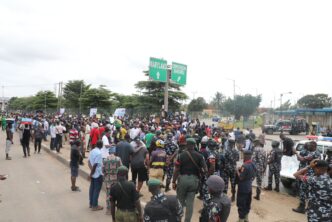BY SALEH SHEHU ASHAKA
Northern Nigeria has persistent security challenges that have significantly impacted the’s stability and development. Issues such as terrorism, banditry, and communal violence have plagued the area, to loss of lives displacement of communities, and general atmosphere of fear and uncertainty. While the Nigerian government has made efforts to combat these issues through military interventions, it is increasingly clear that a multifaceted approach rooted in education and economic stability is essential for sustainable peace in the region.
Before delving into solutions, it is crucial to understand the root causes of insecurity in Northern Nigeria. Factors such as poverty, illiteracy, unemployment, and social inequality have contributed to a fertile ground for violence and extremism. Many young people, lacking access to quality education and economic opportunities, find themselves vulnerable to recruitment by extremist organizations.
The rise of groups like Boko Haram has shown how ideological indoctrination can exploit the desperation of marginalized youth. Banditry, often driven by cycles of poverty and the fight for resources, further exacerbates the situation. The inability of the government to provide basic services and security has led to a crisis of trust, where citizens feel abandoned and resort to self-defense measures or join armed groups.
Education is often touted as a powerful tool for breaking the cycles of poverty and violence. In the context of Northern Nigeria, improving educational access and quality can serve as a crucial strategy for tackling insecurity.
Advertisement
One of the first steps toward achieving this goal is to increase access to education, particularly for girls and marginalized communities. Barriers such as cultural norms, early marriage, and inadequate infrastructure prevent many children from attending school. Efforts should be made to build more schools, provide transportation, and offer incentives for families to send their children to school.
Moreover, the education provided must be relevant and practical. Emphasizing vocational training and life skills alongside traditional academic subjects can help equip young people for the job market. This kind of education allows students to develop critical thinking skills, creativity, and resilience—traits that are essential for navigating an uncertain world.
Additionally, public awareness campaigns can play an important role in changing mindsets about the value of education. Engaging community leaders and influencers can help challenge harmful stereotypes and advocate for the importance of educating both boys and girls. When communities rally around the cause of education, it becomes easier to dismantle the barriers that prevent access.
Advertisement
While education is fundamental, it must be complemented by economic initiatives that create jobs and promote sustainable livelihoods. Economic stability not only helps reduce poverty but also provides individuals with the means to support their families and contribute positively to their communities.
The government and private sector should collaborate to design and implement job creation programs tailored to the specific needs of Northern Nigeria. These could include agricultural initiatives, which are particularly relevant given the region’s rich agricultural potential. Investing in agriculture can lead to food security and wealth generation while also providing jobs for thousands of people.
Furthermore, promoting entrepreneurship among young people can foster a culture of innovation and self-reliance. Microfinance institutions can provide small loans to aspiring business owners, enabling them to start ventures that can sustain their families and uplift their communities.
Investing in infrastructure is another critical aspect of fostering economic stability. Improving roads, electricity, and telecommunications will facilitate trade and attract investments. When businesses can operate efficiently, they can create jobs and stimulate local economies, leading to a decrease in poverty levels.
Advertisement
It is essential to address the underlying grievances that lead to insecurity. Inequitable distribution of resources, lack of representation in governance, and feelings of marginalization all contribute to discontent among the populace.
Inclusive governance is vital for building trust between the government and the people. This involves ensuring that all communities, regardless of their ethnic or religious backgrounds, have a voice in decisions that affect their lives. Local governments should be empowered to take charge of security matters, as they are better positioned to understand the unique challenges in their areas.
Community policing initiatives can also foster a sense of security and cooperation between citizens and law enforcement agencies. When communities work alongside security forces, it creates a shared responsibility for maintaining peace and order. Additionally, police and military forces must be trained to engage with communities in a manner that builds trust rather than fear.
Civil society organizations (CSOs) play a pivotal role in advocating for education and economic stability in Northern Nigeria. They can raise awareness about the importance of these issues and hold both the government and private sector accountable for their commitments.
Advertisement
One of the first toward achieving this goal is to increase access education, particularly for girls and marginalized communities. Barriers such as cultural norms, poverty, and inadequate infrastructure have hindered educational attainment in the region. Programs that provide financial support, such as scholarships stipends for families, can incentivize parents to keep their children, especially girls, in school.
Additionally, establishing more schools in rural and underserved areas, combined with training teachers and providing necessary learning materials, can create an environment where education thrives. Mobile schools or community learning centers can also be effective in reaching remote populations who might otherwise be excluded from formal education systems.
Advertisement
An inclusive education approach that accommodates students from diverse backgrounds—regardless of religion, ethnicity, or socio-economic status—can also mitigate feelings of marginalization and promote social cohesion. Curriculum development must reflect the local context, integrating peace education, conflict resolution, and civic responsibility, which can empower young people to become active participants in their communities.
While improving general education is vital, vocational training programs tailored to the needs of local economies are equally important. These programs can equip young people with practical skills that enhance their employability and entrepreneurship opportunities. By partnering with local businesses, governments can create apprenticeships and job placement initiatives that encourage youth to pursue positive career paths rather than joining armed groups.
Advertisement
In addition to education, fostering economic stability is essential for reducing insecurity in Northern Nigeria. A robust economy can reduce poverty levels, provide jobs, and create a sense of purpose among youth, thereby decreasing their vulnerability to radicalization.
Governments and NGOs should focus on creating job opportunities through public works programs that employ young people in community development projects. Furthermore, small and medium-sized enterprises (SMEs) play a crucial role in economic growth. Providing microloans and support for entrepreneurship can empower individuals to start their own businesses, contributing to economic resilience and stability.
Advertisement
Given the predominance of agriculture in Northern Nigeria, investing in agricultural development can significantly impact economic stability. Programs aimed at improving farming techniques, providing access to markets, and supporting agro-based industries can not only boost food security but also create jobs and enhance livelihoods, reducing the appeal of extremist activities.
Creating a partnership between the government, local communities, and civil society organizations is vital for ensuring the effectiveness of education and economic initiatives. Programs that encourage community engagement in decision-making processes can rebuild trust in governmental institutions and reinforce the notion that citizens have a stake in their local governance.
The security challenges facing Northern Nigeria are complex, with roots in socio-economic factors and educational deficits. However, a comprehensive approach that prioritizes education and economic stability holds promise for breaking these cycles of violence and insecurity. By investing in accessible education, vocational training, job creation, and community engagement, stakeholders can empower individuals, foster economic resilience, and ultimately contribute to lasting peace in the region. It is only through these concerted efforts that Northern Nigeria can move towards a future free from the shackles of insecurity and instability.
Views expressed by contributors are strictly personal and not of TheCable.
Add a comment










